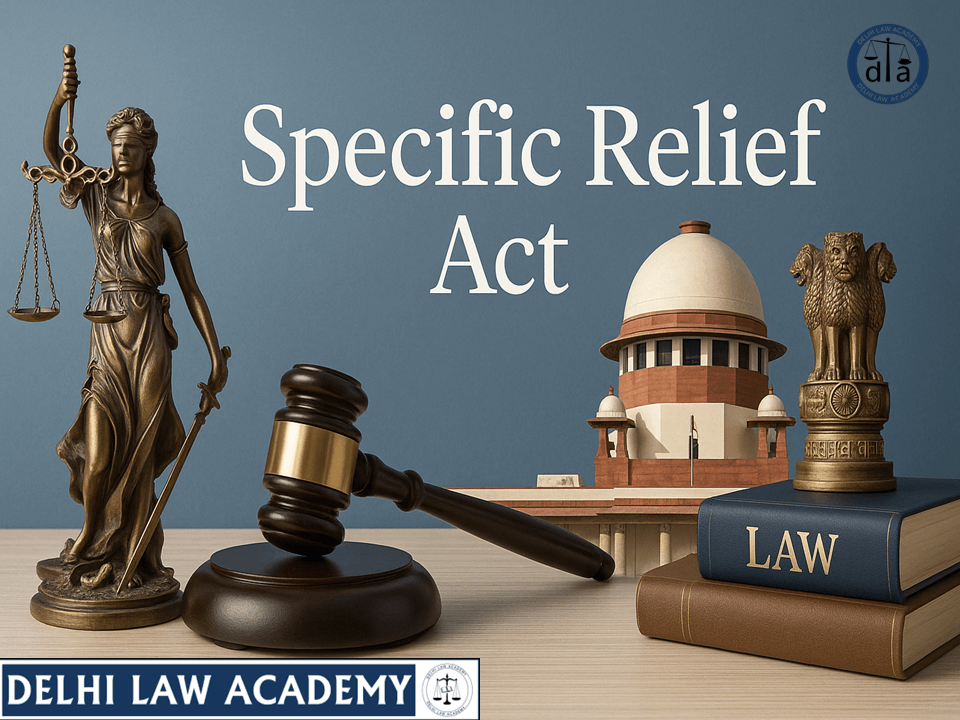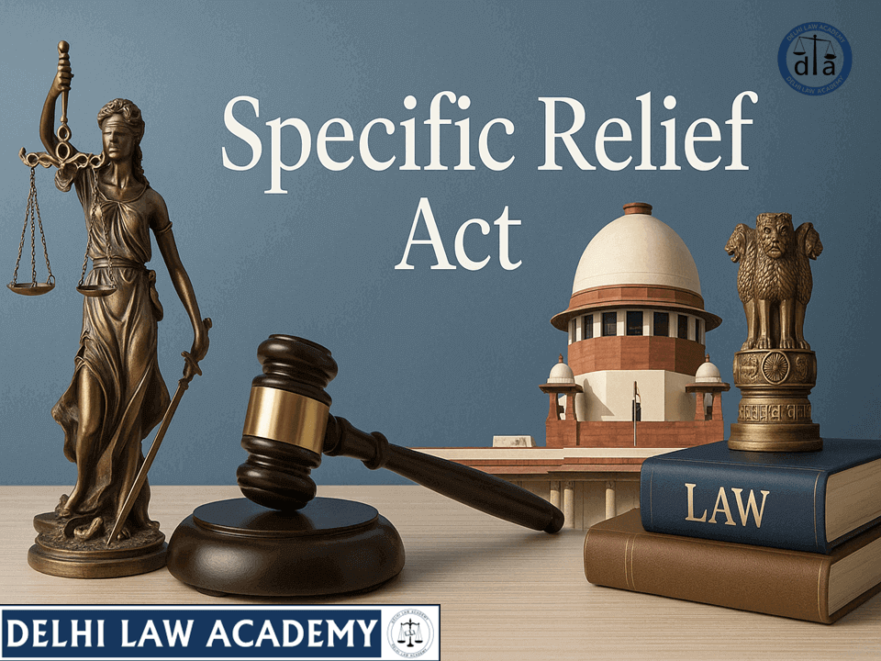
⚖️ SPECIFIC RELIEF ACT: SECTION 10 ⚖️
🏛️ Supreme Court:
- SPECIFIC PERFORMANCE IS NOW CODIFIED AS AN ENFORCEABLE RIGHT.
❓ Question:
- Whether the amended Section 10 of the Specific Relief Act is prospective or retrospective in operation?
💡 Answer:
- The Supreme Court has held in that the 2018 amendment to the Specific Relief Act is prospective and cannot apply to those transactions that took place prior to its coming into force.
📌 Effect of the 2018 Amendment
- After the 2018 amendment, specific performance, which stood as a discretionary remedy, is codified as an ENFORCEABLE RIGHT which is not dependent anymore on equitable principles expounded by judges, rather it is founded on satisfaction of the requisite ingredients as provided under the Specific Relief Act.
📝 Summarized Version of the Supreme Court Judgment
Presented below: Summarized version by Delhi Law Academy Jaipur of the Supreme Court Judgment in the case of Katta Sujatha Reddy v. Siddamsetty Infra Projects [2022]. Original language of the judgment has been maintained; it has not been disturbed or replaced.
📚 KATTA SUJATHA REDDY V. SIDDAMSETTY INFRA PROJECTS [2022]
⚖️ J U D G M E N T
A conspectus of the facts
On 26.03.1997 and 27.03.1997 two agreements to sell were executed between the vendors and purchaser for two separate parcels of land. The sale considerations for the aforesaid land were Rs.38,37,500 and Rs.1,82,500 respectively. Out of the above sale considerations, the vendors received an advance of Rs.34,70,000 and Rs.10,850 in furtherance of the performance of the aforesaid agreement. The remaining amount of Rs.5,39,150 was to be paid within 3 months. This amount had admittedly not been paid within the stipulated time.
A notice was despatched by the purchaser on 31.03.2000, calling upon the appellants to execute the sale deed at a convenient date, suitable to the vendors. The vendor replied to the aforesaid notice by letter dated 14.04.2000 by stating that the purchaser never offered to pay the balance sale consideration and issuance of the notice was nothing but a subterfuge to get over the limitation. Thereafter, a suit was filed by the purchaser only on 09.08.2002.
Issue A: Whether the suit for specific performance is barred by limitation?
This Court has perused Clause 3 of the agreements. The obligation on the purchaser was to make the complete payment of the sale consideration within three months. The clause further mandates forfeiture of the advance amount if the payment obligation is not met within the time period stipulated therein. The language of the agreements makes it clear that severe consequences of forfeiture would ensue if the payment is not made within three months of the date of the agreements.
The intention of the parties is also made clear through Clause 23 of the agreement to sell, which reads: “The parties of the second part herein undertake on any pretext they will not make any claim for enhancing the agreed sale consideration.”
The aforesaid clause clearly freezes any enhancement of the agreed sale consideration, which cannot be independent of a fixed time period. A contrary interpretation would render the contract commercially unreasonable and unworkable. The moratorium on the enhancement of rates prescribed under Clause 23 should be interpreted to be predicated on a fixed time and be executable within a reasonable period. The same should not be utilized to render the commercial wisdom between the parties otiose, which is inherent in drafting such clauses. From the above analysis, it is clear that the contract was strictly conditioned on a time frame.
It is clear that Article 54 of the Limitation Act mandates that in this case, the date fixed for payment of consideration was three months from the date of the agreements (i.e. 26.03.1997 and 27.03.1997). In any case, the time period for filing the suit had commenced from 26/27.6.1997 and would have expired after three years, i.e., in the end of June 2000.
We may note that Article 54 of the Limitation Act provides for two consequences based on the presence of fixed time period of performance. It is only in a case where the time period for performance is not fixed that the purchaser can take recourse to the notices issued and the vendors’ reply thereto. In the case at hand, the aforesaid circumstances do not come into play as a fixed time period was clearly mandated by Clause 3 read with Clause 23 of the agreements to sell.
In light of the above, we may note that the suit filed by the purchaser was clearly barred by limitation in view of the first part of Article 54 of the Limitation Act and no amount of payment of advance could have remedied such a breach of condition.
Issue B: Whether the amended Section 10 of the Specific Relief Act is prospective or retrospective in operation?
This question assumes great significance as application of the 2018 Amendment Act would determine whether specific performance ought to be applied mandatorily or the aforesaid decision is a discretion of the Court to examine whether equity demands such application instead of granting damages if any.
After the 2018 amendment, specific performance, which stood as a discretionary remedy, is codified as an enforceable right which is not dependent anymore on equitable principles expounded by judges, rather it is founded on satisfaction of the requisite ingredients as provided under the Specific Relief Act.
The amendment carried out in 2018 was enacted to further bolster adherence to the sanctity of contracts. This approach was radical and created new rights and obligations which did not exist prior to such an amendment.
This provision, which remained in the realm of the Courts’ discretion, was converted into a mandatory provision, prescribing a power the Courts had to exercise when the ingredients were fulfilled. This was a significant step in the growth of commercial law as the sanctity of contracts was reinforced with parties having to comply with contracts and thereby reducing efficient breaches.
Under the pre-amended Specific Relief Act, one of the major considerations for grant of specific performance was the adequacy of damages under Section 14(1)(a). However, this consideration has now been completely done away with, in order to provide better compensation to the aggrieved party in the form of specific performance.
Having come to the conclusion that the 2018 amendment was not a mere procedural enactment, rather it had substantive principles built into its working, this Court cannot hold that such amendments would apply retrospectively. The amendment act contemplates that the said substituted provisions would come into force on such date as the Central Government may appoint. It may be noted that 01.10.2018 was the appointed date.
We do not have any hesitation in holding that the 2018 amendment to the Specific Relief Act is prospective and cannot apply to those transactions that took place prior to its coming into force.
📚 Continue Your Specific Relief Act Preparation
Don’t stop here! Strengthen your knowledge of the SRA with our other fully solved tests:
📘 Free Study Material for Judiciary Aspirants!
Download our FREE study material prepared by Delhi Law Academy’s expert faculty.
💡 Frequently Asked Questions (FAQs) on Section 10 of the Specific Relief Act
Section 10 of the Specific Relief Act deals with the remedy of specific performance of contracts. After the 2018 amendment, specific performance is codified as an enforceable right and is no longer discretionary, ensuring parties must comply with valid agreements when the statutory conditions are satisfied.
The Supreme Court in Katta Sujatha Reddy v. Siddamsetty Infra Projects [2022] held that the 2018 amendment is prospective. It applies only to transactions executed after the amendment’s enforcement date (01.10.2018) and does not affect prior agreements.
Before 2018, courts granted specific performance as a discretionary remedy based on equitable principles and adequacy of damages. Post-amendment, specific performance is now a mandatory enforceable right when statutory ingredients under Section 10 are fulfilled, reducing the court’s discretionary evaluation of damages.
Two agreements to sell land executed in 1997 involved advance payments and a fixed period to pay the balance consideration. The purchaser filed a suit in 2002, beyond the limitation period. The Supreme Court held that the suit was barred by limitation and that the 2018 amendment could not apply retroactively.
The amendment reinforces sanctity of contracts by converting specific performance into a mandatory right. It ensures parties cannot efficiently breach contracts, promotes compliance, and strengthens commercial certainty by allowing aggrieved parties to claim specific performance instead of mere damages.
Judicial Service aspirants preparing for RJS, DJS, PCS(J) and other exams should study Section 10 thoroughly, including the 2018 amendment and relevant case laws such as Katta Sujatha Reddy v. Siddamsetty Infra Projects [2022], as questions on specific performance are frequently tested in both objective and descriptive papers.
Contact us
📍 Delhi Law Academy – Jaipur Branch
6C, Tower 2, Coaching Hub, Pratap Nagar, Jaipur – 302033
📞 Phone:
+91 9911916552
+91 8447285606
✉️ Email:
contactus@delhilawacademy.com

